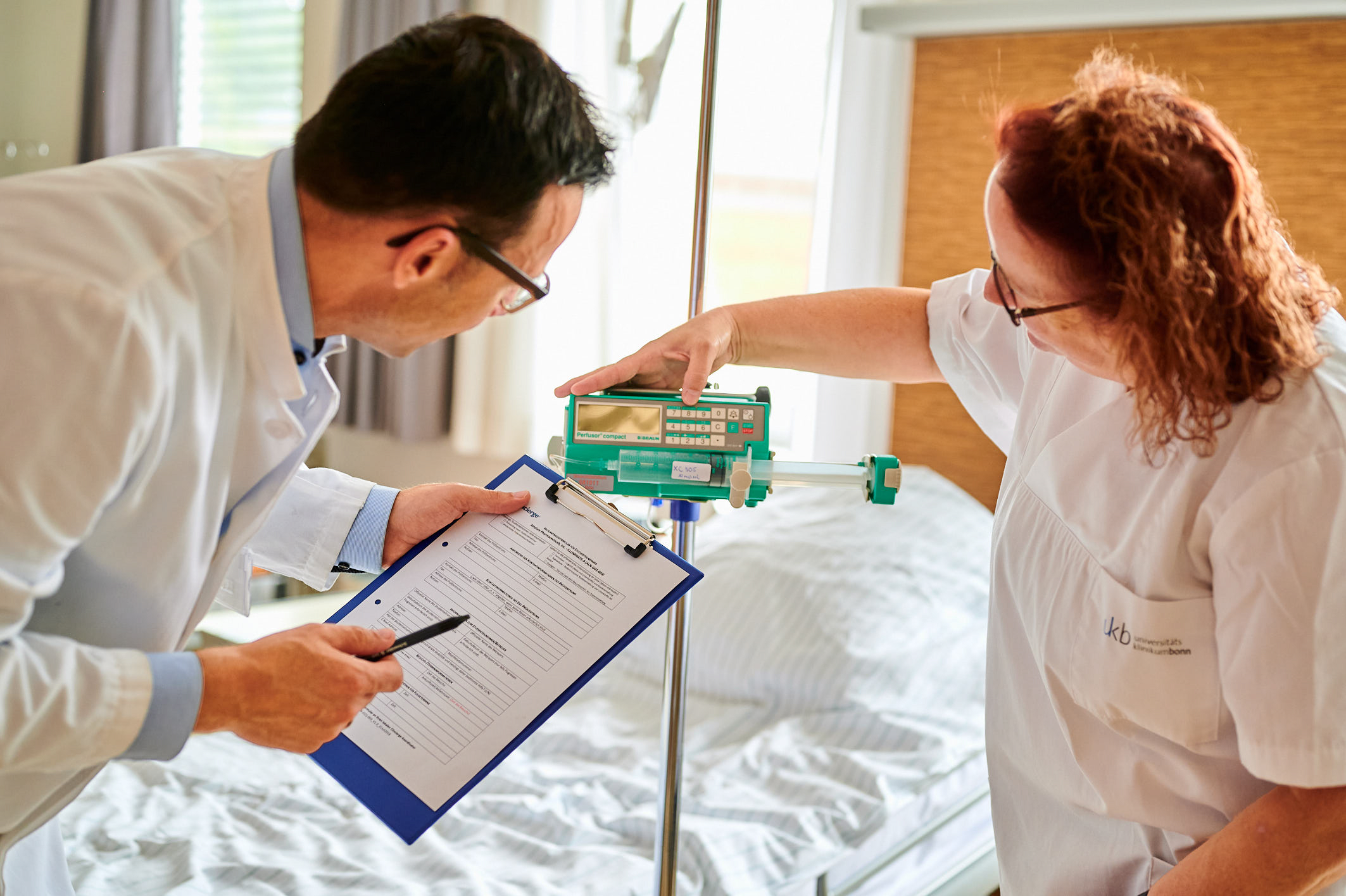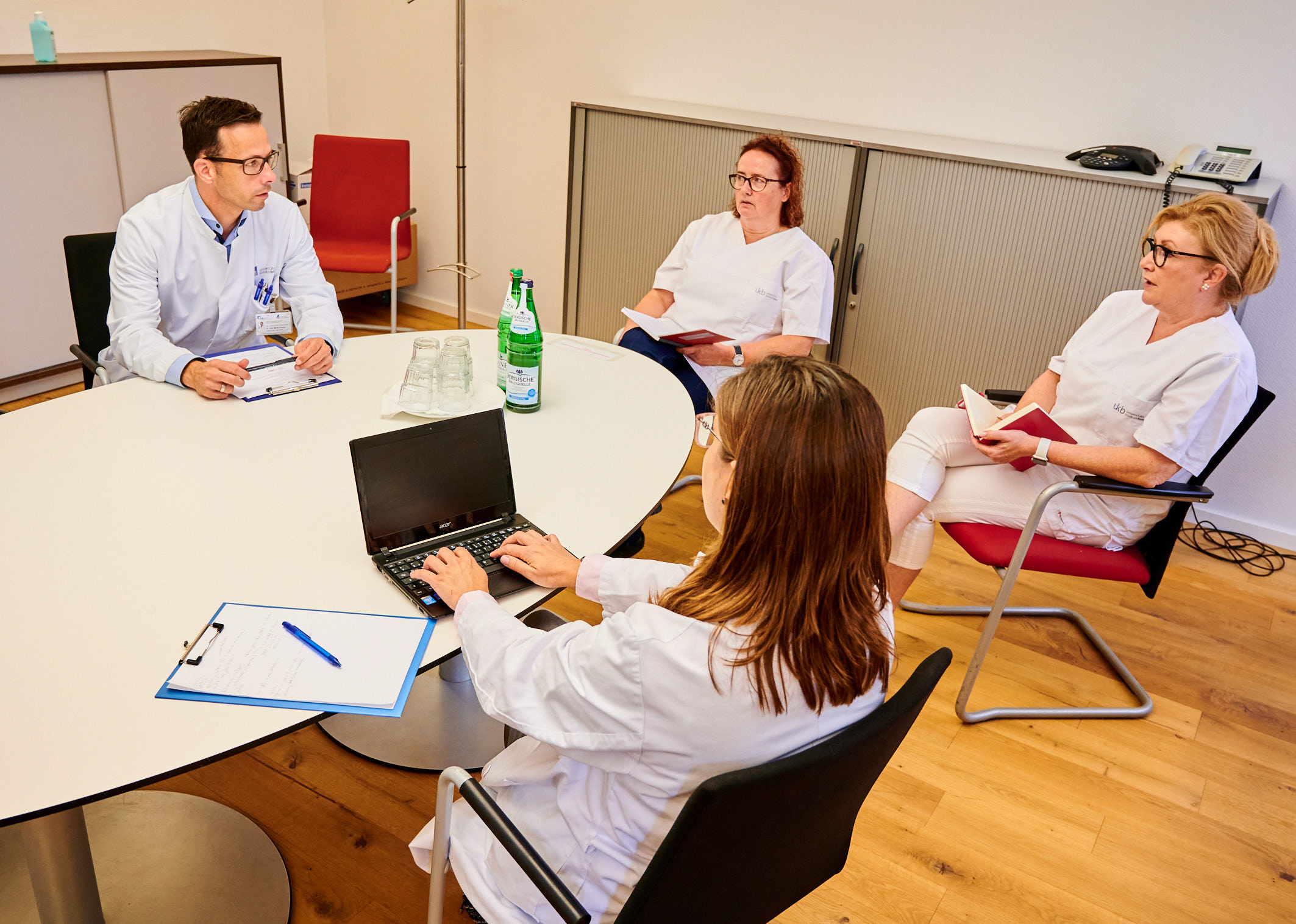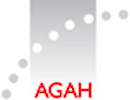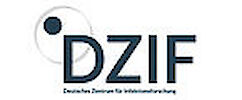Services


Monitoring
The beds on the ward are equipped with monitors for the continuous recording and long-term storage of telemetric 12-lead ECG, pulse oximetry and blood pressure data. All monitored beds and the vital signs of all subjects can be viewed on monitors via the central base.
Emergency management and intensive care
In addition to offering continuous nursing care and the potential presence of a physician around the clock, the ward is integrated into the University Hospital’s emergency system in order to guarantee maximum safety for subjects. The experienced trial team works in line with updated emergency standard operating procedures (SOPs) and is regularly trained inbasic life support (BLS) both internally and and by colleagues from Anesthetics. A separate emergency management agreement is also in place with the Department of Anesthesiology and Intensive Care Medicine. The intensive care unit (ICU) is just a few minutes’ walk in the same building complex. Trials can even be conducted under direct anesthesiological supervision if needed These are ideal conditions for first-in-human (FIH), early-phase and other trials with strict safety requirements for the subjects.
Quality management and SOPs
The Phase I Unit follows standardized processes in line with the regulations for Phase I/FIH trials, which can be adapted in line with the sponsor’s requirements or supplemented with the sponsor’s own SOPs as required.
The extensive list of SOPs is reviewed and updated by the quality management team at the central trial office of the Bonn Trial Center, and trial personnel are given regular training.
Catering for specific diets
The University Hospital Bonn’s kitchen can prepare tailored meals that take into account various kinds of diets. This can be particularly useful in the case of food interaction trials, metabolic trials, dietetic products or active ingredients in food supplements but is also important for the well-being of our trial participants.
Recruitment
- Healthy subjects
Suitable subjects of any gender with different characteristics (smokers, age, allergy sufferers, etc.) can be recruited at short notice using an extensive database run in cooperation with the German Aerospace Center (DLR), among others. Additional public advertising for specific trials, e.g. in newspapers or on notices posted around the University, can also be arranged with minimal lead time if required.
- Patient populations
Cooperations with the relevant departments of the University Hosptial provide access to the various patient cohorts that can be recruited from the outpatient clinics and wards of the University Hospital Bonn.
The TriNetX research platform enables trial organizers to gauge their recruitment potential over a certain period or even to identify specific possible participants by running pseudonymous searches of the University Hospital Bonn’s patient data using certain inclusion and exclusion criteria
Access to specific diagnostic and therapeutic facilities
As a maximum care hospital, the University Hospital Bonn comprises 38 clinics and 31 institutes and offers every option in terms of innovative patient care. These include diagnostic imaging and laboratory analysis methods as well as a wide range of surgical and interventional techniques for all patients, from newborns to the very elderly. Trial projects in the Phase I Unit can also benefit from this expertise and the available staff and infrastructure.
The measurements particularly important in a trial project include radiological imaging (ultrasound, X-ray, computed tomography (CT), magnetic resonance imaging (MRI)), cardiac diagnostics (long-term ECG/blood pressure, echocardiography) pulmonary diagnostics (lung function) and obtaining cerebrospinal fluid samples.
Partners at the University Hospital Bonn
We enjoy close links with the following departments in particular:
- Department of Internal Medicine I (General Internal Medicine, Gastroenterology, Hepatology, Nephrology, Endocrinology, Infectiology)
- Department of Internal Medicine II (Cardiology, Pneumology, Angiology)
- Dermatology
- Rheumatology
- Anesthesia and Intensive Care
However, we also run joint projects with specialised departments from the Neuro-Center (Neurology, Neuro-Oncology, Psychiatry) and the Department of Pediatrics.
Clinical Study Core Unit of the Study Center Bonn
Just like a full-service CRO, the Clinical Study Core Unit of the Study Center Bonn provides personnel, expertise and infrastructure for planning and conducting clinical trials and fulfills the duties of a sponsor in regulated clinical trials and can support an early-phase clinical trial project if required with:
Project management
Monitoring
Biometrics
Data management
Pharmacovigilance
Together with the Phase I Unit all the responsibilities of the trial site and the sponsor for conducting trial projects can be covered.
IMPs
Storage
In the Phase I Unit, IMPs can be stored centrally at -80°C, -20°C, +4°C and room temperature under temperature- and access-controlled conditions in air-conditioned, locked rooms.
Preparing IMPs and reconstitution
The Phase I Unit has its own pharmacists and physicians with the experience needed to prepare IMPs for which no GMP-compliant manufacturing process or cleanrooms are required. Reconstitutions can be done easily on the ward.
Hospital Pharmacy
The central Hospital Pharmacy at the University Hospital can be involved in the manufacturing and storage processes if required. It offers cleanrooms for sterile production and the manufacture of cytotoxic drugs in cleanroom classes B to D as well as staff with the relevant specialist expertise. Additional options for storing IMPs at -80°C, -20°C, +4°C and room temperature under temperature- and access-controlled conditions are available here.
Pain tests
The Phase I Unit has the capability and expertise required to conduct and evaluate specialized pain simulations using the cold pressor test. This is particularly relevant to estimate analgesic effects of new compounds in healthy subjects and can also provoke cardiovascular effects. The effects can also be compared against the pharmacokinetic data of the active ingredients .
Drug Repurposing
The Phase I Unit is a clinical pharmacology partner of the RePo4EU consortium, which advises on, plans and implements drug repurposing strategies. Where requested by the authorities, Phase I trials help in particular to confirm safety in the case of higher doses, combinations of active ingredients or specific populations.
We can provide you with comprehensive support of your strategies, put you in touch with the right people and plan and conduct your trial projects for you.
BioBank
- The BioBank Bonn supports clinical and translational research as well as basic research, e.g. for developing diagnostic, prognostic and predictive biomarkers for specific illnesses. This involves collecting, storing or provision of biological samples and their derivatives (whole blood/serum and other bodily fluids or tissues) in accordance with the applicable SOPs. Most storage is done at -80°C, although there is capacity as also at -170°C if needed.
- Clinical data associated with the samples can also be stored in the BioBank Bonn’s database.
- If required, samples can be subjected to specialised assays and to generate corresponding results or send the samples to partners.
- The following assays are offered as standard:
- Extraction of nucleic acids
- Peripheral blood mononuclear cell (PBMC) isolation
- Separations of cell subpopulations
- Cytokine release assays
Laboratory
- Central laboratory
Within the institution the Central Laboratory of the University Hospital Bonn can provide support and offers instant analysis of biological samples. All analyses offered by a maximum-care hospital can be carried out here:
- Clinical chemistry
- Hematology
- Hemostaseology
- Immunology (allergy diagnostics, autoimmune diagnostics)
- Endocrinology
- Tumor markers
- Specific diagnostics (e.g. electrophoresis, high-performance liquid chromatography (HPLC), oligoclonal bands)
- Reference laboratory
- Therapeutic drug monitoring and pharmacokinetic analyses
- Basic research
The scientific work at the Institute of Clinical Chemistry and Clinical Pharmacology focuses particularly on viral immunology, immuno-oncology, exosomes, circulating nucleic acids and therapeutic oligonucleotides. The individual working groups can provide their expertise for planning and developing specific immunological questions and their diagnostic readouts. Tailored exploratory investigations can be developed based on the following assays:
- Cell culture
- Immunophenotyping
- Functional immunoassays in whole blood, in PBMC or on isolated cell fractions
- Cytokine release, surface expression, killing, gene expression, etc.
- Fluorescence activated cell sorting (FACS) analyses
- NanoString expression analyses
- Meso Scale Discovery (MSD) cytokine multiplex assays
- Developing new assays in consultation with the client
SNP/methylation/mRNA/miRNA analysis
- Sequencing using next-generation sequencing
The possibility of validating these assay methods can also be explored if required together with the Central Laboratory and the Quality Management of the Clinical Study Core Unit.
- Laboratory for specific lipid subanalysis
ImmunoSensation Cluster
ImmunoSensation is a Cluster of Excellence funded by the German Research Foundation (DFG) that studies innate immunity beyond the boundaries of traditional immunology. Its researchers include immunologists, neurobiologists, system biologists and mathematicians from the Faculty of Mathematics and Natural Sciences at the University of Bonn as well as the German Center for Neurodegenerative Diseases (DZNE), which is part of the Helmholtz Association.
It aims to advance innovative research of potential treatments and support clinical research in the context of conducting trial projects. Besides providing access to expert advice, it also allows to directly involve working groups in evaluating and interpreting trial results, in particluar through developing and integrating laboratory assays.
Imaging
The close relationship with the Departments of Cardiology and Pneumology, Diagnostic and Interventional Radiology, Neuroradiology and Nuclear Medicine at the University Hospital Bonn allows diagnostic and imaging procedures for examining clinical trial patients any time.
These include:
- Computed tomography (CT)
- Magnetic resonance imaging (MRI)
- Positron emission tomography (PET-CT)
- Scintigraphy
- X-ray diagnostics
- Ultrasound examinations
- Echocardiography


















